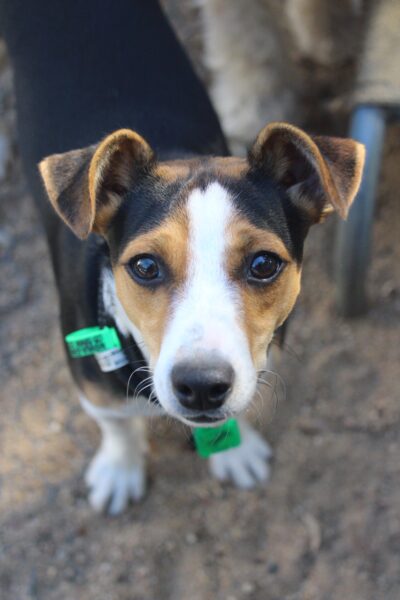We adhere to the Code of Practice for Boarding Kennels in Victoria.
As of October 2024, we no longer accept particular breeds of dogs to stay or play (some of whom appear in the list at the end of this page). We have a sufficient variety of regulars who require particular attention, and we can no longer increase this quota without compromising the safety of our guests. To see how we rank and rate dogs, please read here: Ranks and Caps
Mix-n-Match Dogs, NBKC Style
Nathalia Boarding Kennels and Cattery stands out as one of the pioneering boarding establishments in Australia, introducing the unique ‘open-plan socialisation’ system. Unlike traditional-style kennels, our priority is to allow dogs to play in small packs for most of the day (weather-dependent).

At Nathalia Boarding Kennels and Cattery, social interactions, learning, and game-playing are not just daily occurrences but the very pillars of a fantastic doggy vacation experience.
Overall, we prefer guests who can easily blend with others; however, we can work with dogs that might have a few personality quirks. Our ranking system underpins our carefully considered pack management.
First-time guests must adhere to our introductory assessment-stay program. Read more here.
Because hormones can disrupt the peace, we have stringent rules about desexing. Read more here.
We are strict about vaccinations for the health, safety, and well-being of all who board. Here is why.
Rates are per night based on weight and age (or personality). Further information here.
All Dogs must wear a suitable, correctly fitted collar to protect teeth during play and avoid snagging. Sturdy plastic clips are safest. Conversely, metal buckles, chains, leather, and studs aren’t ideal for pack play. If you forget or don’t have a suitable collar, you can purchase one from us. A correctly fitted collar can fit two human fingers between the neck and band.
Every doggy guest (unless you inform us otherwise) receives a complimentary bath at the end of their vacation.
Managing Yards/Pack
Pet profiles in our booking system are a valuable source of information for our staff, and first-time customers are encouraged to provide as many helpful details as possible. At drop-off, customers can also discuss their pet’s quirks and concerns.
This information will guide our experienced staff, who also consider other factors before mixing dogs. The primary considerations are age, size, and breed, followed by each guest’s abilities and agility. Temperaments are an essential factor as well. Even the location of the yard can impact decision-making.
With 40+ yards at our disposal (spacious, circular, escape-proof, high-fenced, lower-fenced, small, grassed, sanded, concreted, etc.), we can choose yards best suited to each guest’s perks. All yards have water troughs, sprinklers, beds, toys, shade, and shelter.
All items on our property are shared (balls, toys, beds, blankets, etc), so please leave personal items at home – unless you wish to contribute to our stock. Sniff here.
Pack sizes vary, depending on the cohort staying and daycare dogs visiting. We can have from 2 to 8 dogs together in a yard at any time – usually, the small dog yards contain more than the larger ones.
During peak times (Christmas / New Year / Easter), we can host 150 dogs. We know every dog who stays during these times.
First-time guests may spend their first few hours in a yard without companions to soak up the sights, sounds, and smells. After settling, it is time to introduce a buddy.
As a general rule, we rarely mix large dogs with small dogs. However, some older, shy, large dogs might be more comfortable with small or medium geriatrics, and conversely, loveable ratbag small dogs exist best with goofy labs or retrievers.
Dogs, like children, can switch moods quickly, so yards and packs are monitored closely and adjusted frequently. During the day, staff will remove dogs from yards (going home) or add dogs (arriving). While cleaning the yard, games are played, and pictures are taken (if the time & loyal subjects allow). Yard visits provide the perfect opportunity to gauge body language and consider whether a playmate needs a change of scenery.
Bedrooms (Kennels)
We have a variety of sleeping quarters for dogs—traditional rooms for medium to large dogs and comfy giant crates for small breeds. A mix of evaporative coolers, reverse-cycle air conditioners, fans, under-floor heating, blankets and jackets can help our staff adjust temperatures accordingly.
Kennels undergo daily cleaning and disinfecting.
Each dog has a dedicated room or kennel. If the owner permits, dogs from the same family can sleep in the same room. When dogs share a kennel, staff will supervise them while eating.
Puppies

Puppies are kept close to the office area for careful monitoring. A full day of play is tiring, so a ‘paws’ is provided mid-day—usually in the office. Every puppy has breakfast to meet its energy levels and growth requirements.
Regulations stipulate that puppies must be older than 14 weeks for daycare and 16 weeks for boarding.
Puppies must follow the advised puppy vaccination schedule to board or play. Twelve days must elapse after their second puppy vaccination (allowing time for the antibodies to become effective) before they step a paw onto any Boarding Kennel ground.
When puppies reach nine months, our booking system recognises them as adults. Adults must be desexed. Paws here. Our booking system will block bookings if the above requirements are not met.
Dogs Food & Feeding

Dogs are fed in their rooms at night (never as a pack). If family members sleep in the same room, they are supervised or separated at mealtime.
Dogs Evening Meal
The evening meal is included in the boarding rate.
We provide Royal Canin® Premium Nutrition. We choose Royal Canin® because of their quality tailored formulas. This ensures that your pet receives the best possible nutrition in our care. To learn more about Royal Canin®, visit: royalcanin.com/au
We also feed BlackHawk grain-free kibble, Prime100 rolls (made with human-grade ingredients), and Hazeldene’s Fresh chicken wings and fillets.
Evening meals are nutritious and generous. However, to avoid GVD (gastric issues), we don’t dish up overly large feasts, as this is not a safe way to manage calorie intake. Breakfasts are the best way.
Home-cooked meals (warm chicken dinners and meat feasts) are optional extras. However, because these meals are lean, we suggest viewing them as an occasional ‘fine dining experience’ rather than a nightly meal replacement.
All our products contain chicken or traces of chicken. If your dog is sensitive to poultry, please bring your own.
A Dogs Breakfast
While the daily evening meal is sufficient for many adult guests, it is not for others, particularly active and social canines. Thus, breakfast is excluded from the base boarding rate for adult dogs as not all guests require a second meal.
Breakfast is an extra $5 per day and may be selected as an add-on when booking.
When should you add breakfast?
- If you have an active breed (e.g. Vizlers, Kelpies, Pointers, Whippets, Jack Russells etc)
- If you book an extended stay – this is especially important if your dog is playful and social.
- If your dog lost weight during a previous stay with us.
- If your dog takes morning medications that require food.
If you do not add breakfast and your pet drops weight, we will take action to try and rectify this. However, this is much like locking the gate after the horse has bolted.
There are other ways to ‘up’ the calorie intake. You can choose the number of breakfasts (e.g., every second or third day) or book a ‘time-out’ with a platter of poached chicken or a Kong or Licky Mat (peanut-butter/cream-cheese/Prime100).
Silver service breakfast options include poached chicken, bacon-n-eggs or porridge with blueberries.
Supplying your food
There is no discount for supplying your food. If you choose to bring your own (e.g. your pet has special dietary needs), we find the following very helpful:
- Name all items.
- Portion dry kibble into brown paper bags (keeping the environment in mind).
- We store perishable food in fridges and freezers.
- A small solid esky is particularly handy for storing your dry food.
- Breakfast, if supplied, should be 1/4 of the overall daily allowance.
- Please remember that your pet may expend more energy during their stay, so you might want to add a little extra.
Sensitive Tummies
If your pet is prone to a sensitive tummy, we are happy to discuss this with you.
Remember, all of our dry food contains chicken or traces of chicken. If your dog has chicken allergies, please bring your food to ensure that your dog doesn’t suffer from an upset tummy.
If your hound suffers from ‘nervous poops‘, we suggest adding probiotics to their meals during the three days leading up to their vacation (and leaving us some for their first few days with us). A teaspoon of Pot Set yoghurt is another option. Naturally, a chat with your vet about this would be beneficial.
Do we accept all dogs?
As discussed, we prefer to host dogs who can easily blend with others. We do not discriminate against breeds; however, we know from past experiences that specific breeds can find our play environment over-stimulating. On rare occasions, this has triggered poor or dangerous behaviour. This is not safe for our guests or staff. Breeds include:
Bull Terriers- Shiba Inu- American Pitt Bull Terrier – Rottweiler – Dog Argentino (Mastiff) – Doberman- Akita – Gull Dong – Perro de Presa Canario – Tosa Inu – Chow Chow – Shepherd – Cane Corso – Staffy – Heeler (Red n Blue) – Wolfhound – Staghound – Ridgeback – French Bulldog – Bulldog – Maremma – Husky – Malamute – Bernese Mountain Dog – Boxer – Great Dane – Mastiff
For some of the above breeds, we will carefully consider your request for boarding but cannot guarantee a bed. Rates are often higher to compensate for the extra diligence required to monitor them. We also limit the number of particular breeds during peak times.
